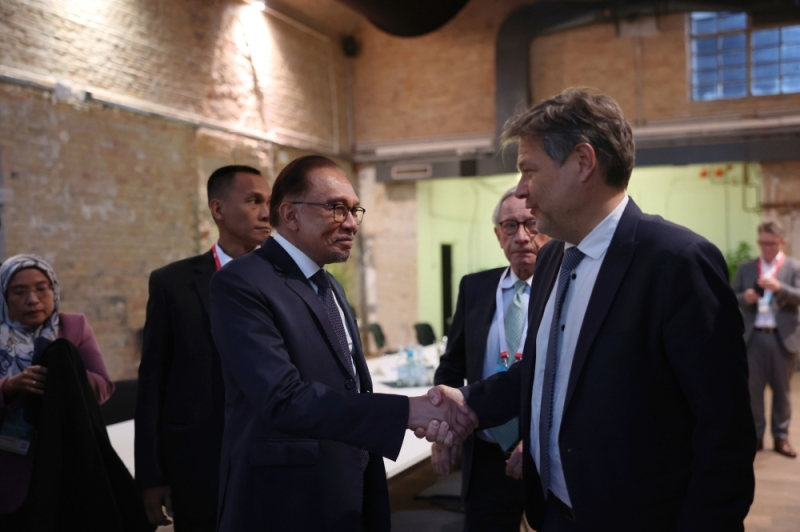Adopt more inclusive, fair treatment on palm oil exports, PM Anwar tells Germany

Prime Minister Datuk Seri Anwar Ibrahim meets Germany's Vice-Chancellor and Minister for Economic Affairs and Climate Action Robert Habeck in Berlin March 14, 2024. ― Bernama pic
Thursday, 14 Mar 2024 7:23 AM MYT
BERLIN, March 14 ― Malaysia, the world’s second-biggest palm oil producer, has urged Germany to adopt a more inclusive and fair approach regarding palm oil exports to Europe.
Prime Minister Datuk Seri Anwar Ibrahim has expressed Malaysia's concern that European Union (EU) policies on climate change, including its Deforestation Regulation, may serve as a form of non-tariff trade measure.
The concern was raised during Anwar's meeting with Germany's Vice-Chancellor and Minister for Economic Affairs and Climate Action, Robert Habeck. The meeting took place at the Berlin Station here before Anwar delivered his keynote address at the annual SME Future Day 2024 (Mittelstand).
Anwar was accompanied by Foreign Minister Datuk Seri Mohamad Hasan, Minister of Investment, Trade and Industry Senator Datuk Seri Tengku Zafrul Tengku Abdul Aziz and Minister of Entrepreneur and Cooperatives Development Datuk Ewon Benedick.
Both leaders hope for a positive outcome
On the Malaysia-EU Free Trade Agreement (FTA), both leaders also hoped for a positive outcome of the “scoping exercise” between the technical experts of both sides and for them to start discussions.
FTA negotiations were launched in 2010 and put on hold after seven rounds in 2012.
Malaysia and the trade bloc embarked on a scoping exercise recently to determine the gaps in the respective positions and stances, which would then provide direction to ensure that any negotiations consider the costs and benefits to the country. Malaysia has thus far enforced 16 FTAs and 62 investment guarantee agreements.
Other issues discussed were capacity building and skill enhancement, as well as the proposed collaboration to enhance the skills of micro, small and medium enterprises (MSME) via joint training, workshops, and mentorship programmes.
Malaysia also acknowledged Germany’s support for Asean through the Asean Coordinating Committee on MSME and Asean Access (a business platform for market expansion within Asean member states).
On education, Anwar told Habeck that currently over 1,000 Malaysian students study in Germany, especially in engineering, and expressed hope for more, including in Technical and Vocational Education and Training (TVET).
Malaysia also welcomed Germany’s participation in its energy transition ― the National Energy Transition Roadmap (NETR) ― for a cleaner economy, green growth, decarbonisation strategy and green financing.
Anwar also said Malaysia is keen to join the Climate Club and welcomes Germany’s support in capacity-building, technology transfer and financial assistance. ― Bernama
Thursday, 14 Mar 2024 7:23 AM MYT
BERLIN, March 14 ― Malaysia, the world’s second-biggest palm oil producer, has urged Germany to adopt a more inclusive and fair approach regarding palm oil exports to Europe.
Prime Minister Datuk Seri Anwar Ibrahim has expressed Malaysia's concern that European Union (EU) policies on climate change, including its Deforestation Regulation, may serve as a form of non-tariff trade measure.
The concern was raised during Anwar's meeting with Germany's Vice-Chancellor and Minister for Economic Affairs and Climate Action, Robert Habeck. The meeting took place at the Berlin Station here before Anwar delivered his keynote address at the annual SME Future Day 2024 (Mittelstand).
Anwar was accompanied by Foreign Minister Datuk Seri Mohamad Hasan, Minister of Investment, Trade and Industry Senator Datuk Seri Tengku Zafrul Tengku Abdul Aziz and Minister of Entrepreneur and Cooperatives Development Datuk Ewon Benedick.
Both leaders hope for a positive outcome
On the Malaysia-EU Free Trade Agreement (FTA), both leaders also hoped for a positive outcome of the “scoping exercise” between the technical experts of both sides and for them to start discussions.
FTA negotiations were launched in 2010 and put on hold after seven rounds in 2012.
Malaysia and the trade bloc embarked on a scoping exercise recently to determine the gaps in the respective positions and stances, which would then provide direction to ensure that any negotiations consider the costs and benefits to the country. Malaysia has thus far enforced 16 FTAs and 62 investment guarantee agreements.
Other issues discussed were capacity building and skill enhancement, as well as the proposed collaboration to enhance the skills of micro, small and medium enterprises (MSME) via joint training, workshops, and mentorship programmes.
Malaysia also acknowledged Germany’s support for Asean through the Asean Coordinating Committee on MSME and Asean Access (a business platform for market expansion within Asean member states).
On education, Anwar told Habeck that currently over 1,000 Malaysian students study in Germany, especially in engineering, and expressed hope for more, including in Technical and Vocational Education and Training (TVET).
Malaysia also welcomed Germany’s participation in its energy transition ― the National Energy Transition Roadmap (NETR) ― for a cleaner economy, green growth, decarbonisation strategy and green financing.
Anwar also said Malaysia is keen to join the Climate Club and welcomes Germany’s support in capacity-building, technology transfer and financial assistance. ― Bernama
No comments:
Post a Comment